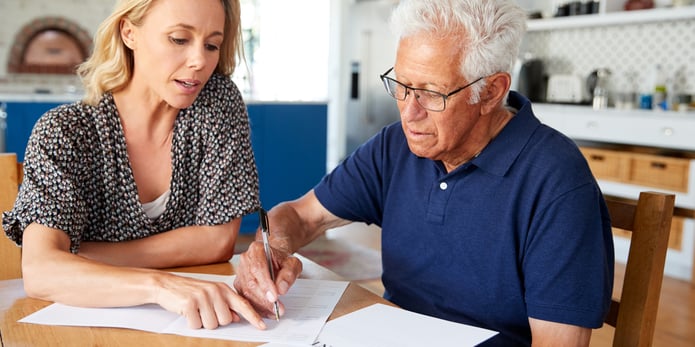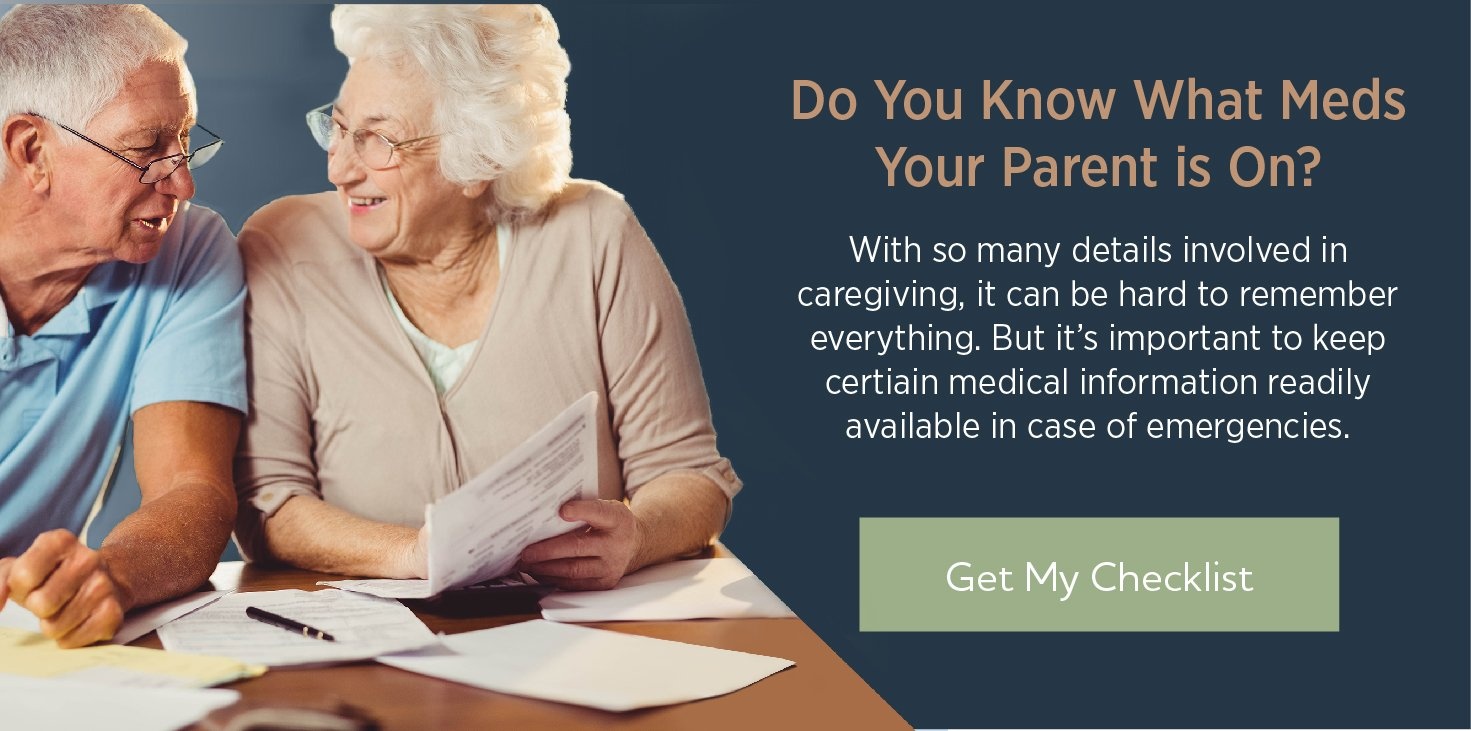
It’s normal to think — or hope and pray — that medical emergencies may happen to others but not to us. Yet 15% of all emergency room visits are made by people 65 and older.
Preparing for a medical emergency can not only help reduce your and your loved one’s fear and anxiety, but it can also better their chance of recovery.
But in between helping your loved one shop for groceries and get to doctor appointments, you might not be sure where to start. Plus, there are some simple things you can do that many caregivers often overlook.
Whether your aging parent lives with you or they still live on their own, here are five tips for preparing for a medical emergency with your older parent.
1. Check Up with Check-ins
If you and your aging loved one don’t live together, it can be hard to know how often to check in. Calling morning, noon, and night to quiz them about what they’ve eaten might not go over too well.
Just like you didn’t appreciate being smothered as a teenager, your parent doesn’t want to feel like they’re being babysat, either. But what older parents do want is to feel love and support from their children. Calling, especially when it's voluntary and based on affection rather than duty, can go a long way. You’re able to gauge how your loved one is doing, and they remain happy and healthy.
Perhaps you call every other night. Or maybe you call one day and your sibling calls the next. In general, how often you should check in on an aging loved one depends on a few factors:
- Does your loved one have an existing medical condition or any recent medical problems, such as a fall or other health care issue?
- Does your loved one have access to a community that encourages strong bonds?
- Does your loved one live far away?
Phone calls are a simple way to reach out, and they go a long way toward keeping your relationship strong.
2. Get a Medical Alert System
Even if you live with your aging parent, you can’t always be there when Mom or Dad needs you. That’s where a medical alert system comes in. Also known as a personal emergency response system, a medical alert system can summon help with the push of a button.
Why not just use a cell phone? Because it’s highly unlikely that your mom or dad will have their phone with them at all times. How many times a day do you get up from the table and leave your smartphone sitting there? If your parent doesn’t have a wearable emergency response system, they’re at risk.
Typically worn on the wrist or around the neck, medical alert systems are monitored 24 hours a day, seven days a week, and can dispatch family members or first responders within moments.
Some signs your loved one might benefit from a medical alert system include:
- They live alone.
- They have fallen before — once a fall has occurred, the risk of another fall doubles — or they have a fear of falling.
- They have mobility issues as a result of a past injury.
- They have trouble getting around the house or have an unsteady gait or weakness.
- They don’t have friends, family, or neighbors nearby who can routinely check on them or arrive quickly should they need assistance.
- They take medications that can cause them to experience dizziness or vertigo, which puts them at higher risk for a fall.
For seniors who wish to live at home longer, medical alert systems can provide valuable security, especially for those who live alone, because they provide access to emergency help 24 hours a day.
3. Keep Emergency Medical Information on the Fridge
Having certain medical information readily available can significantly decrease stress when an emergency occurs. It can also ensure your loved one gets the help they need as quickly as possible.
An emergency medical file should include:
- A copy of important legal documents and instructions on where to access the originals
- Names, addresses, and phone numbers for your loved one’s emergency contacts as well as their health care team
- Copies of all up-to-date insurance cards
- A record of your loved one’s health history, including ailments, symptoms, and other medical information
- A list of all of your loved one’s medications, including over-the-counter drugs, vitamins, herbal products, and other supplements
- A log of all medical appointments and test results
Once you’ve compiled the emergency medical file, make sure your loved one knows where it lives and provide copies to other family members so you can all be prepared no matter what happens. Also, print a copy and place it — along with your loved one’s living will and durable medical power of attorney forms — in a clear plastic bag or an envelope labeled “Emergency Medical Information.” Secure the bag or the envelope to the refrigerator door or inside the front door and remember to update the worksheet as needed.
Also keep a copy where first responders can easily find it, such as inside the front door, on the refrigerator, inside the cabinet door where medications are stored, and inside the glove box.
4. Prep a Hospital "Go" Bag
Create a “go” bag that you or your loved one can grab in an emergency. It should contain all of your loved one’s emergency medical information as well as the essentials they’d need to have a comfortable and easy stay at the hospital.
Here are some things you might consider packing up ahead of time and storing until necessary:
- Emergency Medical Information Worksheet
- Eyeglasses or contact lenses
- Denture cleaning supplies
- Hearing aid batteries
- A small supply of emergency medications or devices
- A change of clothing: underwear, socks, top, bottom, sweater, slippers
- Toiletries: hairbrush, toothbrush, deodorant, lip balm, lotion
Keep in mind that you need only small quantities, replenishing them if necessary. Keep the bag in a familiar spot in your loved one’s house.
5. Run Emergency Drills
Now, it may seem silly, but one of the best ways to prepare for an emergency is to make a practice run. By putting yourself in a real-time simulation of an emergency, you can make sure that you have everything prepared and that you know how to respond when an emergency actually strikes.
For example, encourage your loved one to practice getting up off the floor. If they can’t do it in practice, they won’t be able to do it if they’ve fallen. So what would they do next?
If you follow the above tips, hopefully they’d be able to press a button on a life alert necklace that would immediately alert you and the paramedics that they require assistance. You could then quickly grab your hospital “go” bag and the emergency medical information file attached to the front of the fridge and get to the hospital as soon as possible.
Don’t have an emergency medical file? No problem! That’s why we created this Emergency Medical Information Worksheet. It is intended to help you keep track of your loved one’s medical information so it can be shared with paramedics, emergency room staff, and urgent care clinicians if they develop a need for urgent medical care. By organizing their most important medical details in one place, you and your loved one won’t have to scramble to find it or remember it during a crisis.






